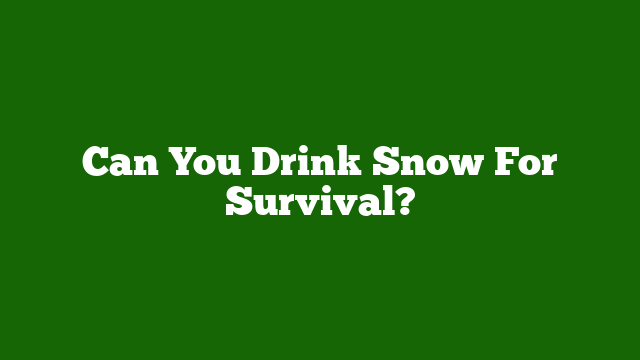Last Updated on June 12, 2023 by Umar
As winter approaches and snow begins to cover the ground, the question of whether or not you can drink snow for survival becomes relevant.
In this comprehensive guide, we will explore the pros and cons of using snow as a source of hydration, how to safely melt and consume snow, and the potential risks associated with this practice.
Pros of Drinking Snow for Survival
- Alternative source of water: In a survival situation where no other sources of water are available, snow can serve as a temporary solution to quench your thirst.
- Sustainable: Snow is a natural resource that comes directly from the sky, meaning it doesn’t use up resources or come in plastic bottles, making it environmentally friendly.
Cons of Drinking Snow for Survival
- Cooling effects: Consuming large quantities of cold snow or ice can lower your body temperature, potentially leading to hypothermia and other health issues.
- Potential contaminants: Snow can be contaminated with chemicals, dirt, and other impurities, which could pose health risks if consumed.
- Dehydration: Eating snow can actually lead to dehydration, as the process of melting snow inside your body requires energy and can strain your metabolism.
How to Safely Melt and Consume Snow
To safely melt snow for drinking, follow these steps
:
- Collect ice or snow, preferably ice as it is more compact and contains more water than snow.
- Use a pot with good insulation and a lid to conserve fuel.
- Start with a thin layer of snow or ice on the bottom of your pot, never packing it to the top.
- Add snow or ice gradually until you have the desired amount of water.
Risks and Precautions
- Hypothermia: Consuming large amounts of snow can lower your body temperature, increasing the risk of hypothermia.
- Dehydration: As mentioned earlier, eating snow can lead to dehydration due to the energy required to melt it inside your body.
- Contamination: Snow can contain chemicals, dirt, and other impurities, which could pose health risks if consumed.
- Nutrient deficiency: Drinking snow may damage your teeth and lips due to a lack of important nutrients.
Conclusion
While snow can serve as an alternative source of water in a survival situation, it is not without risks.
The cooling effects of consuming snow can lead to hypothermia, and potential contaminants in the snow may pose health risks.
Additionally, eating snow can actually lead to dehydration.
If possible, always opt for other sources of water, such as streams or bottled water, before resorting to snow.
If snow is your only option, make sure to melt it safely and consume it in moderation to minimize potential risks
.

